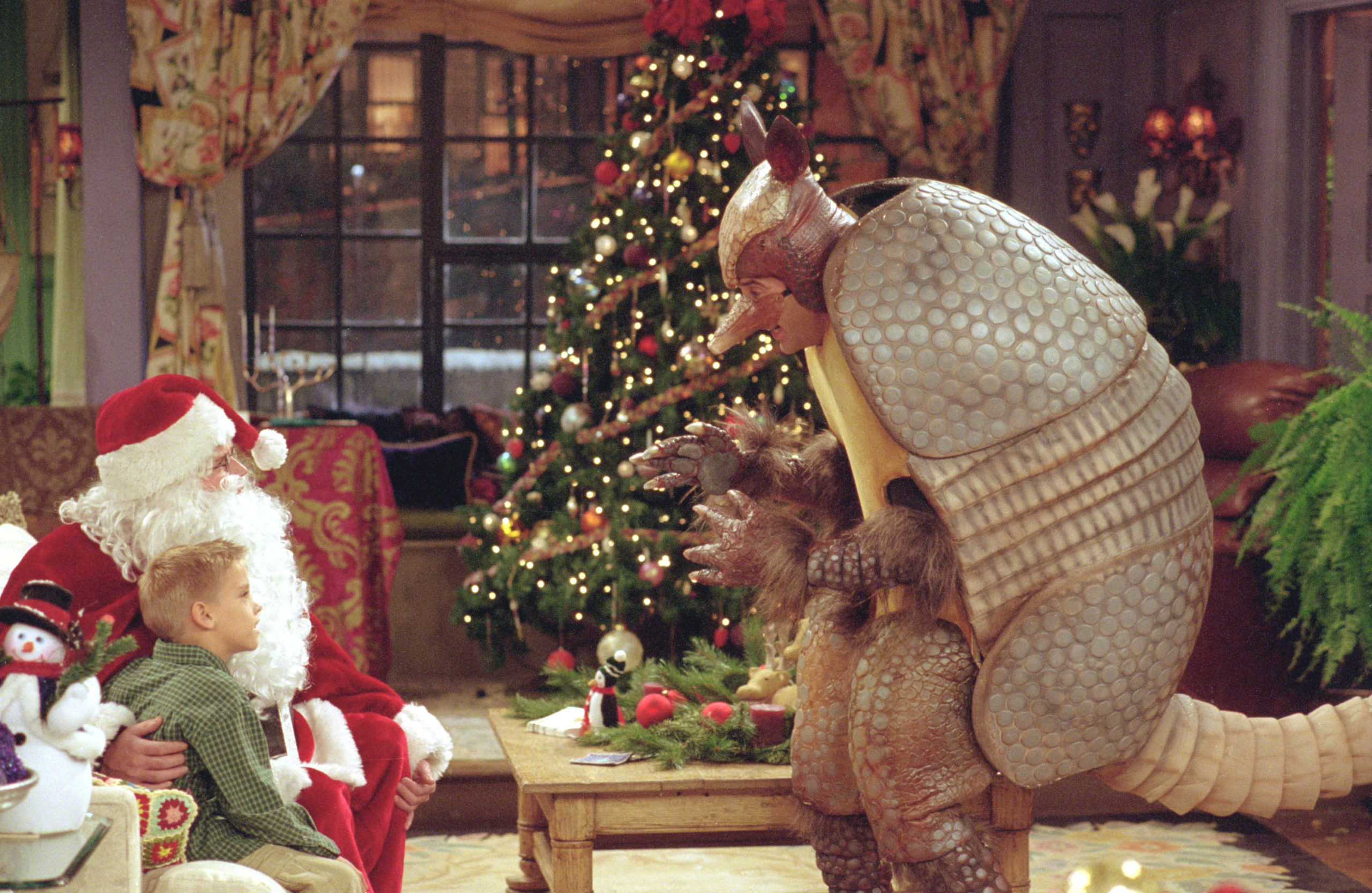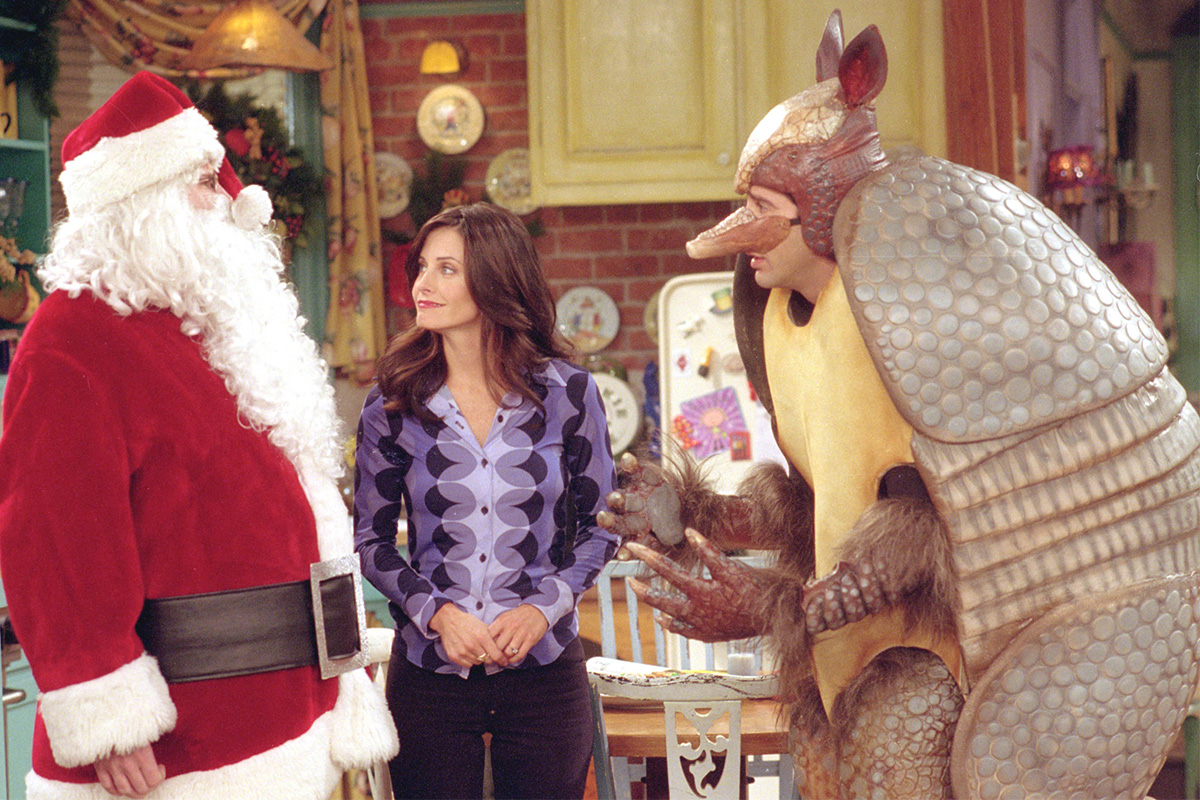Which is your favorite season of “Friends,” and why is it season seven?
I admit, I have been an (almost) lifetime fan of the show “Friends.” It’s been my comfort show for the majority of my life. I consider Chandler Bing to be my first comedic influence, because he showed me I could guard myself from all the fear and insecurity of being a preteen by making myself a punchline. I recently bought a tower of “Central Perk” mugs in a thrift store in the name of “reparenting” — I’m still not sure what that is, but my best guess is addressing the lost sense of joy I felt upon seeing them. My family friends’ parents still blame me for getting them into the show as well. Despite its availability of streaming on HBO Max, I have held onto my well-loved boxed DVD set.
There is one disc in particular that falls into the “most watched” category: season seven, disc two. I love it for the perfect arc of episodes, including one that stands out above the rest: “The One with the Holiday Armadillo.” It is, simply, the most unique holiday episode I have seen.
For me, returning to this episode after spending the last two years so deeply immersed in the online Jewish community has gotten me thinking about its deeper message — and what it says about an issue many Jewish institutions seem to get wrong about fostering enthusiasm for a Jewish identity. As I have grown wiser, I can acknowledge that “Friends” missed the mark in many ways in terms of representation, including their portrayal of Judaism, however I believe that “The One with the Holiday Armadillo,” perhaps unintentionally, provides a beautiful message of Jewish identity, one that we can all learn from.
For those less familiar with this episode, a quick recap: Ross announces he gets his son, Ben, who mostly lives with his mom, for the holiday season. Ross, who is Jewish, says he wants to take this year to teach his son about Hanukkah. We then see the scene where he tries to teach Ben about Hanukkah, but Ben is really excited about Christmas (because that’s what he’s been celebrating with his mom his whole life). He asks if Santa is coming and is disappointed when Ross says no. He’s so disappointed that Ross decides to try and find a Santa costume. Unfortunately, the costume shop is all out of “anything Christmas-y.” But they have an armadillo costume, and so Ross becomes the “Holiday Armadillo.”

First of all, why is Ross just beginning to introduce Ben to Hanukkah at age 6? Surely at some point Ross could have asked to see Ben for at least part of Hanukkah? Of course he’s not going to be excited about Hanukkah if his family has been making a big deal about Christmas every year and he has no idea what Hanukkah is. Perhaps this is a result of Ross’s own complicated feelings about his family dynamics, or maybe it’s just the way to create tension in the plot. But either way, as we learn later in the episode, Ben being disappointed about not celebrating Christmas doesn’t mean he’s not interested in Hanukkah.
The moment I want to focus on is when the Armadillo says “Happy Hanukkah” and Ben mentions that he’s part Jewish — which is a twist in the episode. When Ross brought the holiday up earlier, Ben seemed totally uninterested. In this moment we see that, as excited as Ben is about Christmas, he still understands that part of his identity is Jewish, and he feels that it’s worth mentioning. Why? Perhaps it is a ploy to get more presents — although his question, “Are you for Hanukkah, too?” comes off as pretty genuine. This shows the type of pull Judaism has, even on kids who have been disconnected from it.
Now with Ben’s full attention, Ross-as-Armadillo begins to tell the story of Hanukkah again. Unfortunately, at this moment, Chandler comes in dressed as Santa and the part-Jewish interest plummets (because Santa is there, obviously). They decide Chandler will leave, prompting Ben’s disappointment and request that the Holiday Armadillo leave instead. Ross is resigned until Chandler suggests that he sit with Ben (as Santa) and listen to the Armadillo tell the story of Hanukkah. Ben says “OK, Santa” and sits down next to Chandler, looking attentive.

When we flash back to the scene later in the episode, Ben has moved away from Chandler towards Ross as Ross finishes up the story with his arm around him. Ross says, “and instead of lasting for one night, the oil lasted for,” and Ben repeats back “eight whole days,” showing that the knowledge has successfully been transferred (from generation to generation). The episode ends with the whole gang gathered around a menorah in Monica’s window, as “Tradition” from “Fiddler on the Roof” plays in the background.
“The One with the Holiday Armadillo” tells the classic Jewish tale of the inner conflict we never need to have. Can Judaism and Jewish traditions exist in a world where the secular culture is so heavily Christian? The episode is brilliantly crafted, as this conflict plays beautifully into the strained dynamic between Ross and his son from his first failed marriage. But just as the episode ends by showing us that Ross and Ben really do love each other, the episode carries another message: Jewish identity has its own pull, and Judaism is, as Ben says in the end, “awesome!” It can exist powerfully beside other traditions simply through proud, unapologetic practice. No smoke, no mirrors, no armadillos needed (in the words of Monica Gellar, “now that’s a sentence I never thought I would say”).
Late Take is a series on Alma where we revisit Jewish pop culture of the past for no reason, other than the fact that we can’t stop thinking about it?? If you have a pitch for this column, please e-mail submissions@heyalma.com with “Late Take” in the subject line.




